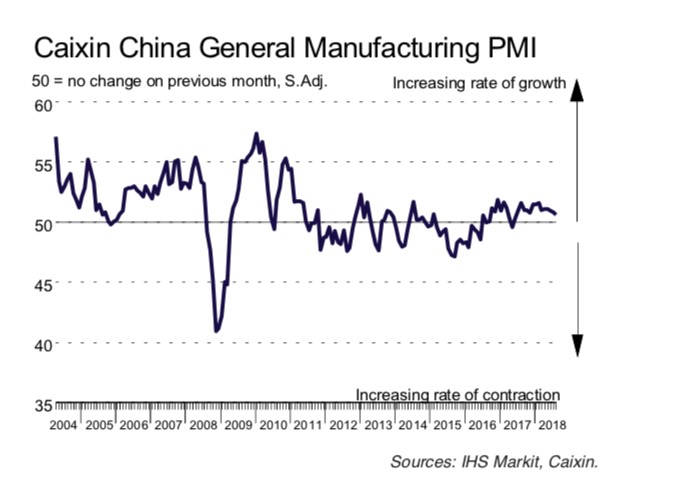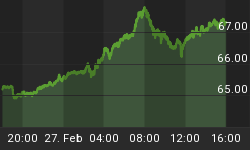Output of Chinese manufacturers has continued to expand, but there are clear signs of weakness in August and indications that the tariff wars are taking a toll.
The Caixin/Markit Purchasing Managers Index (PMI)—a key indicator for the Chinese economy that surveys private manufacturing—dropped down to a 14-month low in August, hitting its weakest point in over a year, coming in at 50.6 and down from 50.8 in July.
This is the third month in a row that the index has dropped.
The problem isn’t the overall output picture, but the figures suggest that new orders are increasing at their slowest pace since May 2017. But it also shows a slowdown in export sales for the fifth consecutive month.

(Click to enlarge)
The concerns widen with the index’s note that employment was also trending down, while outstanding workloads were increasing. Manufacturing input costs and output charges were seeing “steeper increases” as inflationary pressures picked up, the report said.
Overall, PMI said that “confidence towards the 12-moth remains lackluster”. Related: Tesla Struggles To Meet Production Targets
“Positive forecasts were generally linked to expectations of rising client demand. However, concerns over the ongoing China-US trade war and softer demand conditions weighed on overall sentiment,” noted the PMI press release.
Dissecting the PMI report isn’t black and white. If you just look at the numbers for the sake of numbers, things don’t look so bad. Generally, any reading above 50 indicates expansion. So while a reading of 50.6, clearly shows expansion, and the PMI notes production outlook over the next 12 months still remaining in “positive territory”, the manufacturing sector is weakening nonetheless.
“Generally speaking, the manufacturing sector continued to weaken amid soft demand, even though the supply side was still stable. Prices of industrial products were underpinned by a proactive fiscal policy, and environmental protection policies that had limited some factory production. I don’t think that stable supply can be sustained amid weak demand. In addition, the worsening employment situation is likely to have an impact on consumption growth. China’s economy is now facing relatively obvious downward pressure,” the press release quoted Dr. Zhengsheng Zhong, Director of Macroeconomic Analysis at CEBM Group, as saying.
However, slowly, the tariffs seem to be having a negative effect on the Chinese economy—and the trade war shows no signs of letting up any time soon.
In July, both sides hit each other with tariffs on $34 billion in goods, then in August another $16 billion both ways, and Trump has vowed to hit China tariffs on an additional $200 billion in goods as soon as this week. In fact, the deadline for this decision is Thursday.
Related: 3D Guns: Where Tech And Anarchy Merge
The latest fallout in the trade war is Ford’s announcement that it will cancel plans to import a new crossover model from a Chinese plant because tariffs make it economically unfeasible.
Others say the trade war hasn’t had any effect on the Chinese economy—yet.
In a recent note to clients carried by Business Insider, Societe Generale economist Wei Yao said the main factor in China’s economic slowdown is the government’s crackdown on infrastructure investment, which is growing this year by 5.3 percent, compared to 18.5-percent growth in 2017.
By Fred Dunkley for Safehaven.com
More Top Reads From Safehaven.com
















